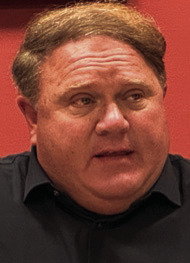Questionable actions for a strange week
By By Terry Cassreino / assistant managing editor
Dec. 7, 2003
In a grand display of complete disdain for the public, the Meridian School Board, Meridian City Council and Meridian Community College snubbed the people on three separate occasions in the same week.
It appears all three believe that they can drag their feet on important, high-profile issues or that they shouldn't share what is otherwise public business with the public. The school board even falls into both categories.
What happened? Well, let's take a look back at a two-day period last week in which public officials took questionable actions that left many people scratching their heads in wonder.
The most recent was Wednesday, when MCC officials sponsored a private, invitation-only luncheon attended by local elected officials and other invited guests. Among the topics discussed: funding for higher education.
About 30 people attended the luncheon, including county supervisors, city council members, the mayor and even state legislators. The public and the media, amazingly, were not invited.
Why? Because MCC President Scott Elliott, who discouraged a newspaper reporter from attending the luncheon, said the event was "not newsworthy." Forget that higher education funding and overall state finances are expected to be major issues when state legislators open the 2004 Legislature in January. The luncheon and its topics were "not newsworthy."
Elliott said later Wednesday that he regretted discouraging press coverage. But that came way too late. The meeting was well over, and recaps are never as good as hearing a presentation first-hand.
One day earlier, the Meridian School Board met. While the board didn't talk about funding, it did discuss an issue just as important: the ongoing search for a new school superintendent.
Actually, a more apt description might be the superintendent search that never began.
School board members have known since November 2002 that they needed to hire a superintendent to fill a job that became vacant June 30. It's now more than a year later and the board hasn't interviewed a single candidate.
Last week, board members met in a 30-minute closed session. They decided to halt their "search" at least until next year and name Interim Superintendent Sylvia Autry the official superintendent.
Autry no doubt has done an admirable, impressive job. But if the board plans to search for a new superintendent, then it should do just that rather than delay the issue for one more year.
And what's with the secrecy? Why did school board members discuss obviously public business the future of public education in Meridian behind closed doors and out of the public's sight?
While state law allows public bodies to close meetings to discuss "personnel matters," it doesn't require them to do so. The board could have, and arguably should have, met in full view of the public.
At least the Meridian City Council didn't close its meeting that same day when members made their own strange decision: They delayed, yet again, final approval of a list of streets the city plans to repair.
What made that decision so peculiar is that city officials will fund the repairs with a $6 million loan that has been sitting idle in a bank account since August.
Here's the catch: Meridian is obligated to pay 3.76 percent interest on the loan at taxpayer expense from the day it received the money whether or not the money is being used for anything.
That's comparable to a man who walks into a bank, borrows $20,000 to make repairs on his house, takes the cash with him and then decides to wait four months before doing anything to his home. He may have nothing concrete to show for the loan he made, but he darn well better pay that monthly note on the loan including principal and interest.
Apparently, none of this matters to our public officials, many of whom have a penchant for closed, private meetings and would rather avoid the spotlight while discussing important, tough issues.
And that's too bad. Because if this area experiences any more days like last week, the sense of contempt for the public that some officials have created could come back to haunt them.













